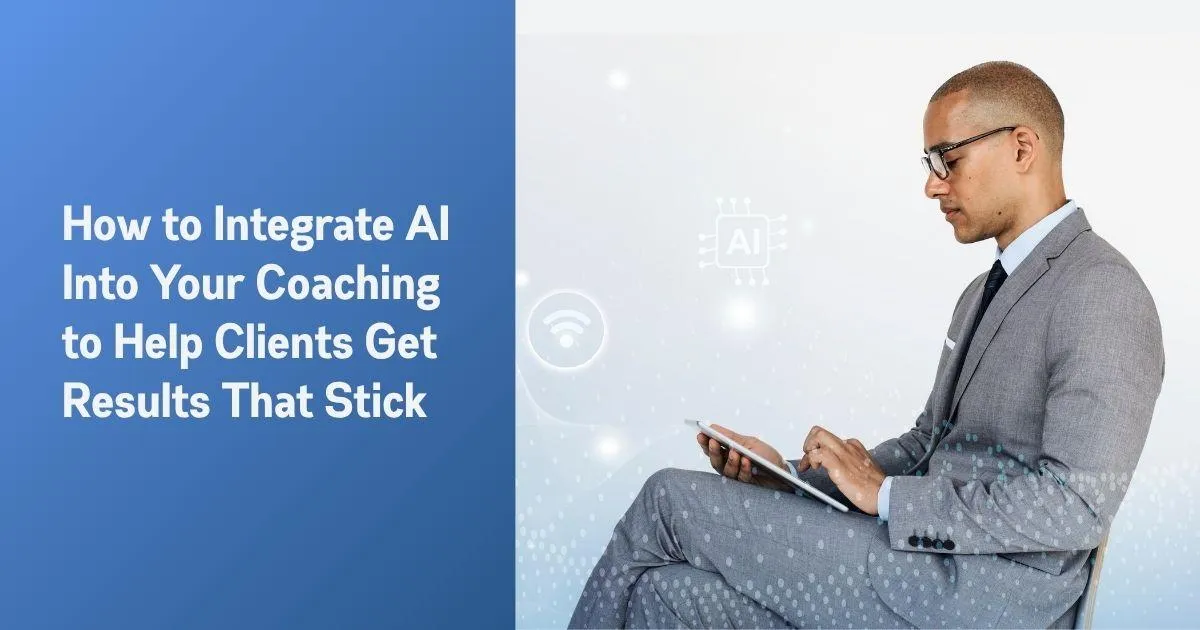
How to Integrate AI Into Your Coaching to Help Clients Get Results That Stick
You must have noticed that the coaching world is getting louder and more competitive. Clients aren’t just looking for a good coach anymore. They want a smart system. One that remembers where they left off, responds quickly, and delivers results faster.
And this is where AI steps in to help you amplify your coaching experience for your clients.
AI isn’t some cold robot that takes over your client sessions. It's more like an intelligent assistant. It handles the repetitive tasks, surfaces key insights from client data, and gives you more time to do what only you can do: coach with heart and intuition.
Is AI A Threat for Coaches?
Some coaches worry AI will make things impersonal. But the truth is, it’s the opposite when used right. AI frees you from admin overload and helps you personalize coaching like never before.
For example, instead of spending 30 minutes after every session typing notes and summaries, you can use tools like Fireflies.ai or Otter to automatically transcribe and summarize the call. You get your time back and a searchable history of every session.
Coaches using AI today are:
Onboarding clients with chatbots that answer FAQs while they sleep.
Using client analytics to tailor sessions more effectively.
Sending automated, personalized follow-ups that keep clients engaged between sessions.
Running group coaching with AI-powered insights that make every member feel seen.
AI isn’t a magic fix. But when used strategically, it makes you more consistent, more effective, and more scalable.
In this blog post, I’ll walk you through:
What AI can and can’t do in coaching.
Where to integrate it in your business.
The best tools to use.
How to implement it smoothly.
Privacy and ethical considerations.
How to measure results,
And what the future holds for advanced AI coaching.
Let’s get into it without any further ado!
What is AI’s Role in Coaching Business
When coaches hear “AI,” some picture a robot replacing deep conversations, but that’s not what’s happening, and it never will. The real power of AI lies in doing what humans shouldn't waste their time on: the repeatable, the measurable, and the data-heavy.
Your job is to bring empathy, intuition, and transformation. AI’s job is to support you by providing speed, structure, and insights.

What AI Can and Cannot Do in Coaching
AI Can:
Automate administrative tasks (scheduling, session notes, follow-ups).
Analyze data to identify client patterns and predict outcomes.
Generate personalized resources (emails, exercises, content).
Act as a first-touch assistant to engage and qualify leads.
AI Cannot:
Read the emotional subtext in your client’s tone.
Build trust through lived experience.
Coach with compassion or hold space during a vulnerable breakthrough.
Replace ethical decision-making and moral nuance.
What Areas to Integrate AI Into Your Coaching

Integrating Artificial Intelligence (AI) into your coaching practice can significantly enhance efficiency, personalization, and scalability. Here are the primary areas where AI can be effectively integrated into coaching:
Step-by-Step Guide to Implementing AI in Your Coaching Business
By now, you're convinced enough that AI can help, so let me break down the ‘how’ for you. The biggest mistake coaches make is diving into tools before figuring out what they actually need. You don’t want a bunch of apps collecting dust on your digital shelf. You want AI that works with your systems, for your goals.
Here’s a no-fluff roadmap to get started the smart way:
1. Map Your Time-Drains
Open your calendar, open your inbox, and look at where your energy leaks.
Are you spending hours:
Sending reminders?
Writing recap emails?
Logging session notes?
Highlight anything repetitive, admin-heavy, or distracting you from deep client work. That’s your automation shortlist.
2. Choose Tools Based on Function, Not FOMO
Instead of asking “What’s the best AI tool out there?”, ask: “What task do I want to take off my plate this week?” Once you know the function (e.g., scheduling, note-taking, progress tracking), then research options. Look for tools that:
Integrate with your current setup (calendars, CRM, email, etc.)
Are these AI tools GDPR/CCPA compliant if you work with sensitive client data?
Have reliable customer support or training documentation.
Don’t over-optimize for features you won’t use. Start with one clear use case.
👉Explore further about the role of AI agents in coaching and how they can streamline your systems while keeping the human touch. Read the article →
3. Start Small and Test
Treat AI like a new hire, you don’t throw it into the deep end on day one. Pick one part of your workflow to automate. Run a 2 to 4-week test. Pay attention to:
Whether it saves time.
Whether your clients notice (and like) the change.
Whether it makes your delivery smoother.
4. Set Clear SOPs (Standard Operating Procedures)
Once something works, document it. How do you want the tool to behave? What do you want it to send, track, or prompt? This helps if:
You want to train a VA or team member later.
If you ever want to switch the tool later.
You want consistency across client experiences.
5. Loop Clients In, They’ll Respect It
Let your clients know what you’re using and why.
Example: “To make our sessions more focused, I’ve started using a smart note-taking tool that records key insights and sends you a summary. Let me know if you ever want me to pause it."
Most clients won’t just be okay with AI, they’ll be impressed you’re innovating to serve them better.
6. Review, Refine, Repeat
Every 6–8 weeks, check in on your AI systems:
Are they saving you time?
Do they help clients engage better?
Are there new gaps you could automate next?
Think of this like training a muscle. The more you refine it, the more efficient your coaching business becomes.

AI Ethics in Coaching
Nothing kills trust faster than a coach who automates everything and disappears behind the tech. Yes, AI can make your coaching life easier. But if you want clients to stick, they need to know the heart behind your system is still you.
Here’s how to stay sharp, ethical, and client-first while using AI:
1. Don’t Let AI Hide Behind the Curtain
If your client gets a super-personalized message and later finds out it was AI-crafted… yikes. That’s not slick, it’s sketchy.
Tell them upfront:
“I use AI tools to support your coaching journey, like sending reminders and recaps, but I review and customize everything myself.”
People respect transparency. It makes your tech feel like a service, not a script.
2. You Need Consent, Not Just Clicks
Using AI to track behavior? Store notes? Send emails based on data? Then don’t just bury that info in a generic terms page. Spell it out.
Make it simple:
“I may use smart tools to track our progress or send tailored support. Is that okay with you?”
Verbal confirmation + written opt-in = peace of mind for both of you.
3. Privacy: If It Feels Like Overkill, You’re Probably Doing It Right
Coaching = trust. And trust = protect their data like it’s your own.
Choose tools that comply with GDPR/CCPA or your country’s laws.
Don’t store sensitive info in random notes apps.
If your AI tool uses cloud storage, ask where that data lives.
4. AI Is a Sidekick, Not the Star
Your AI tool might draft a killer summary or suggest what to send next, but it doesn’t know when a client is holding back or about to cry. That’s your job. Use AI to support your instincts, not replace them. Human warmth is still your edge.
5. Don’t Automate the Soul Out of Your Work
If everything feels pre-written, templated, and “optimized,” your coaching becomes forgettable.
AI should handle the boring parts so you can show up with full presence. That’s the magic combo: automated back end, deeply human front end.
How to Measure the Impact of AI on Your Coaching Business
Now that you've learnt how to integrate AI into your coaching practice by automating tasks, personalizing client experiences, and scaling your services. Let's understand how you know it's making a difference.
1. Track Client Satisfaction and Retention
Happy clients stick around. Use surveys and feedback forms to gauge satisfaction levels. Monitor retention rates to see if clients are staying longer since implementing AI. A study found that even a small 5% increase in retention can grow profits by 25% to 95%.
2. Monitor Time Saved on Administrative Tasks
AI should be freeing up your time. Keep a log of how much time you spend on administrative tasks before and after AI implementation. This will help you quantify time savings and reallocate that time to more valuable activities.
3. Analyze Revenue Growth
Compare your revenue figures before and after integrating AI. Look for trends and patterns that indicate growth.
4. Evaluate Client Engagement
Use AI tools to track client interactions, such as email open rates, click-through rates, and session attendance. Increased engagement often correlates with better outcomes and higher satisfaction.
👉 Want to turn your client wins into high-converting content without extra effort? Here’s how AI becomes your marketing wingman.
Advanced AI Applications for High-Ticket Coaches
Now let’s talk about using AI to grow and deepen your coaching impact.
1. Personalize the Client Journey
AI has the ability to track patterns in your clients’ behavior, goals, and check-ins to give you a clear picture of where each person stands. This helps you show up with the right message or offer at the right time, without guessing.
2. Spot What Clients Need Before They Ask
AI tools can flag early signs of drop-off, burnout, or confusion based on usage data. This lets you step in early with support, keeping your clients on track and committed.
3. Build Smarter Communities
AI can group your clients by goals, stage, or challenges. So, your group programs, peer sessions, or Slack communities feel tailored, not random.
4. Scale Without Losing Touch
Want to serve more people without burning out? AI helps you build online courses, group coaching, and hybrid programs that still feel personal. From content delivery to progress tracking, it handles the heavy lifting so you stay present where it matters.

👉 Curious where coaching is headed next? Read his deep dive into the future of coaching covers trends, tech, and how to stay ahead with AI.
Or
👉The coaching industry is evolving fast. See what’s coming next and how AI positions you to lead, not lag.
Final Word from Purely Startup
As a coach, you must understand that AI isn’t about doing your job. It’s about clearing the clutter so you can do your job better. The emails, the scheduling, the session summaries, the follow-ups, AI can handle those. However, this gives you more time to coach deeply, show up fully, and scale intentionally.
Your clients don’t want a robot. They want you, the real, human coach. But they also want speed, relevance, and support between calls. AI helps you deliver all of that, without burnout.
Start small but start smart. Audit one workflow. Try one tool. See what changes. No tech degree needed, just a willingness to work smarter.
If you want help figuring it out? Book a free AI audit for your coaching business with us!


